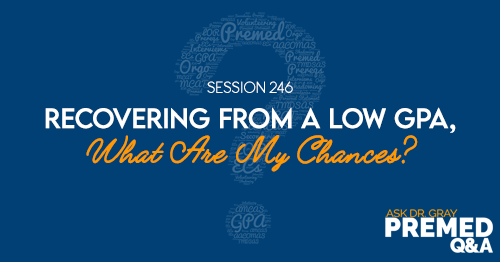Apple Podcasts | Google Podcasts
Session 218
This young applicant wants to know how they can outweigh their age in their medical school application.
Ask Dr. Gray: Premed Q&A is brought to you by Blueprint MCAT. Listen to this podcast episode with the player above, or keep reading for the highlights and takeaway points.
The episodes in this podcast are recordings of our Facebook Live that we do at 3 pm Eastern on most weekdays. Check out our Facebook page and like the page to be notified. Also, listen to our other podcasts on MedEd Media. If you have any questions, call me at 617-410-6747.
[00:21] Question of the Day
Q: “I’ve been watching the podcast and the virtual shadowing for a long time. So I really appreciate all you’ve done for me in my premed journey. And now, here I am working on my secondaries.
During my MCAT studying semester (last spring), I took 11 credits, which is one less than full-time. Some of the prompts ask: Explain a significant academic fluctuation. Would you consider that to be an academic fluctuation taking a three-fourths credit or not? Because I still took five classes. I feel like it’s not insignificant. I was taking hard science classes just a little bit lighter loads so I can study for the MCAT as well.
A: There may be a specific prompt that says, if you were not a full-time student, during your academic career, then maybe you have to answer that question. But I wouldn’t call 11 credits versus 12 a significant fluctuation.
[02:00] Talk About the Impact, Not Just the Story
Q: “I have a prompt that asks: Explain gaps in your education, academic missteps, or personal challenges not listed elsewhere. I haven’t had life-changing or life-shattering personal challenges. And so I feel like if I tried to, I could write about something that’s been challenging.”
A: Many premeds tend to overstate their response to this question by sharing extreme personal anecdotes such as being shot 10 times as a child, being a refugee, or having lived with wolves for the first five years of their life. However, that is not what this question is about.
The question seeks more context on who you are as a person and the challenges you have faced, which will naturally differ from one individual to another.
While some may have been through extraordinary experiences, others may have had their fair share of struggles. It’s important to acknowledge that everyone has faced challenges in their life, and we should be grateful for the good things that we have been blessed with.
'Where a lot of students go wrong with that type of question is they only talk about their dad, and don't talk about how it impacted them.' Click To TweetWhen discussing your father’s journey, it’s important to highlight how it has influenced you. For example, you could share how his experience has impacted your mindset, studying habits, or grades.
However, it’s important to avoid simply stating that his journey has strengthened your desire to be a doctor, as this does not address the “challenge” aspect of the question. So, when reflecting on this topic, make sure to consider how your father’s journey has specifically shaped and impacted your personal development.
[04:43] Should You Compete with Other Students?
Q: “I’m 20 years old. I just finished my second year of college. I’m graduating a year early. And so, I really have done a lot of looking into talking to many students who have had success and I know that the premed comparison game is not very fair to ourselves.
Looking at what has been successful and others, I’ve done a lot of the same things and more than many people who have had success, even though I’ve been premed a couple of years less than the average person.
And so with that, what’s your advice for me as a young applicant, who, to be honest, the experiences that I have looked like, I’ve been doing this for four years?
Because I have been working extremely hard for two years straight, juggling all the premed things. And so, I’m confident in my application, I’m confident that I’m ready to go to medical school.
As a young applicant, I can’t get over the fact that I haven’t lived as much life as the people I’m competing with. How do I portray myself well, as an applicant to the admissions committees?”
A: There’s no need for you to alter your approach as a young or older non-traditional applicant. The most important thing is to tell your unique story. As someone who is aware of what other applicants are doing, you may feel compelled to compare yourself to them, but it’s essential to remember that this journey is uniquely yours.
As a younger applicant, it may be challenging to obtain enough clinical experience or shadowing hours while also being a good student and preparing your application.
However, there are ways to overcome these challenges. The key is to focus on your own narrative and experiences. It’s possible that you may face questions about your age and readiness, but it’s crucial to have a well-crafted response that speaks to your specific journey. Avoid comparing yourself to others, as this is not the purpose of the question.
“This is your journey. This is your story. This is your application to medical school… Just focus on you and your story.”Click To Tweet[07:39] Addressing the Diversity Question
Q: “As a white male from a privileged background, the immediate ideas of what diversity is, I don’t immediately click into some of those. The good thing is medical schools believe that diversity is more than your age and your race and the color of your skin.
And so with that, the diversity that I have been writing about is more diversity of experiences, diversity of perspectives, because to be honest, I don’t bring a diversity of race and ethnicity, or gender.
When I get asked those questions, I write about my diversity of youth work experiences, and how that has led me to an interest in pediatrics. I also write about the diversity of different patient populations that I’ve served and worked with, as well as things I’ve studied in school developmental psychology.
I’m especially passionate about early life (baby to toddler) because that’s when a lot of the cognitive restructuring of how you’re going to interact with the world for the rest of your life happens. So those are the things that I’ve been focusing on. How do you feel about that?”
A: As a white male, diversity is not solely defined by the color of your skin or your background, especially if you are not from a disadvantaged background. Merely stating that you come from an ethnic or racial minority in your diversity essay is not enough.
The key is to showcase how your unique experiences and background can contribute to the educational environment for your classmates.
For example, if you come from a disadvantaged background, you could share how you have overcome obstacles and developed resilience that can benefit others in the class. Alternatively, as a white male, you may have had different life experiences that can bring a unique perspective to the classroom. However, simply stating that you studied a particular subject in school does not necessarily qualify as a diversity angle.
It’s essential to focus on tangible experiences that have shaped your view of the world and can contribute to the class. For instance, if you had extensive experience working as a child psychologist, this would be a valuable addition to your application. Ultimately, the key is to highlight what skills, traits, and experiences you possess, regardless of your background, that can contribute meaningfully to the class’s growth and development.
“What skills, what traits, what experiences do you have, from whatever background you have, that you can bring to the class?”Click To Tweet[11:31] Looking for the More Fitting School
Q: “I applied to 19 schools, which I got a lot of advice as to kind of how many to apply to and, ultimately, I tried to apply to the general idea of some bridge schools, some schools that are more fitting, and then a couple of schools that are a little bit lower.”
A: The terms commonly used in college admissions, such as “bridge,” “safety,” and “fit” schools, do not apply to medical school admissions. Applying to a mix of reach, safety, and fit schools based on your academic stats and experiences is not a reliable strategy for getting accepted into medical school. Even applicants with perfect academic scores and extensive extracurricular activities can receive rejections or acceptances from all types of schools.
Instead of focusing solely on statistics, such as MCAT scores or GPA, it’s crucial to consider how these numbers impact your chances of getting accepted to different programs.
While a high MCAT score may open more doors for you, having a slightly lower score does not necessarily close any doors.
It’s also important to be cautious when looking at med school admission statistics, such as the MSAR as they can be misleading and unhelpful. Instead, focus on crafting a compelling personal statement that highlights your unique experiences and qualities that will contribute positively to the medical school community.
[14:22] Does the Prestige of a School Matter?
Q: “How important is the “prestige” of the medical school? I don’t love that word a ton, because I really do believe that a lot of medical schools are providing wonderful education and creating incredible doctors. But ultimately, for residency programs, it sounds like they do care. They’re going to look at someone from Harvard differently than someone from a state school. That’s what I’ve heard.”
A: The prestige of a medical school is not as significant as students tend to think. What really matters is the networking opportunities that come with attending a more prestigious school. For instance, if you attend Harvard Medical School, your chances of getting into a Harvard residency will increase because you have access to a wider network of professionals in the field.
However, this doesn’t mean that the quality of education that you will receive at a less prestigious school like Podunk State University will be inferior.
The education and the opportunities for matching into competitive specialties are going to be the same regardless of the school. While it’s possible for someone who attends Podunk State to match into a Harvard residency, the student who attends Harvard Medical School may have an edge due to their access to networking opportunities and connections. This is not to say that the name of the school is all-important, but rather the access and exposure the institution can offer.
“The surveys show that school name recognition or prestige is much lower on the list of what residency program directors care about.”Click To Tweet[17:11] Which Schools to Pick
Q: “I applied to 19 schools. I can’t say with any confidence if I’m going to get into any or which ones. I’m excited to find out. And so say, I get into multiple schools, say I get into my state school, which is going to be cheaper, and also a wonderful school. I’m from Minnesota and the University of Minnesota. I would be elated to go there, especially because it’s a top pediatrics program. And so I would really, really love to go to the University of Minnesota. And say, I also get into Chicago and Aurora, Colorado. How would you recommend going about deciding?
Even if I’m planning on going into the lowest-paid specialty, the difference in tuition probably won’t be a huge, huge deal. Unless maybe I’m wrong. But how would you recommend going about deciding? Because I got a much higher MCAT score than I expected. And all of a sudden, I realized, maybe I can start considering these world-renowned schools and top programs. And I did apply to them.”
A:
Similar Issue During Residency
Medical students can fall into a similar trap when selecting residency specialties. Some may choose to apply to more competitive specialties, such as dermatology or radiology, based solely on their high Step 1 score, rather than pursuing a specialty that aligns with their passions and interests. This can lead to burnout and dissatisfaction with their career path.
Probably, this issue will continue even with Step 1 transitioning to pass/fail, and Step 2 becoming more important in the selection process. Similarly, you may have fallen into a similar trap by deciding to apply to more prestigious medical schools based solely on your MCAT score.
That’s without considering other critical factors such as curriculum, location, class size, and overall fit. It’s essential to consider all aspects of a program before making a decision that will impact your future career.
Tuition
When choosing between schools, tuition should not be your only consideration. After receiving all of your acceptances, narrow down your options to two schools. Consider the cost of attendance, including tuition, room and board, and other expenses. For example, one school may cost $100,000 annually while the other costs $50,000 per year.
The difference in cost, such as $400,000 versus $200,000, is significant and should be taken into account when making a decision. Interest rates may also factor into your decision-making process. Once you’ve considered everything else, such as the school’s location and academic programs, weigh the cost difference and choose the school that feels like the best fit for you. If you prefer the more expensive school, but it will cause financial strain, consider asking for merit scholarships or other forms of financial aid.
[22:54] Attending Three-Year Programs
Q: “What is your perspective on three-year programs? Up to 40 to 60% of people switch careers. 75% are switching specialties. Milwaukee, Green Bay, I would love that. It’s a primary care focus community-based. The only reason that I’ve heard people say maybe don’t do that is because say you discover you want to do neurosurgery. Now you’re in a smaller program with a shorter time, not as much ability to rotate.”
A: When considering medical school, it’s common to have a specific area of interest, such as pediatrics or family medicine, and to look for direct pathways into these fields.
It’s important to research the available options and consider the implications if you change your mind. For instance, if you commit to a residency program along with your acceptance, you may have less flexibility in switching specialties. Additionally, if you attend a three-year medical school without a direct pathway into residencies, you may have a year that is unaccounted for in terms of rotations and other requirements. However, if you decide to change your specialty during this time, you can take an extra year to do research and apply for residencies as if you attended a four-year school.
While there is potential for flexibility, it’s also important to be aware of the potential issues and plan accordingly.
Links:
Medical School HQ Facebook page
Medical School HQ YouTube channel
Instagram @MedicalSchoolHQ
Join the Application Academy!
The Premed Playbook: Guide to the Medical School Personal Statement
The Premed Playbook: Guide to the Medical School Application Process
SEARCH SITE
LISTEN FOR FREE












